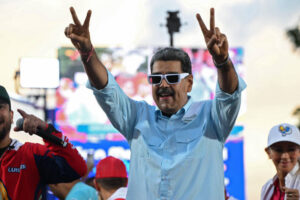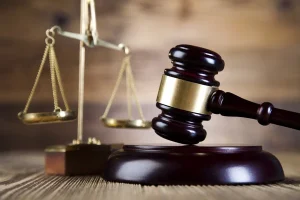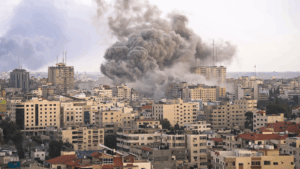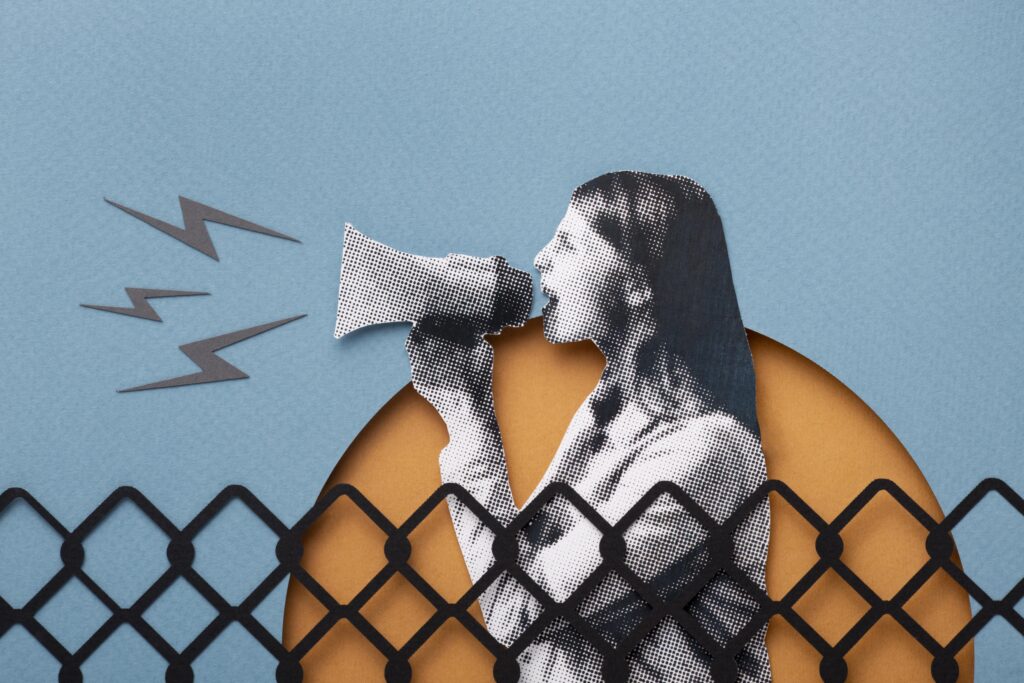The freedom of speech and the freedom of expression are matters that have always been scrutinized in every nation and every democracy. On the other hand, the role of religions and beliefs, sometimes has an impact on the way countries regulate their laws on free speech. It is a debate we can run into in art when a caricature, a painting, or a song is considered offensive. It can be found in health matters, like abortion. It can even influence the country’s economic governance and decisions.
The concept of freedom also brings the concept of limitations, bans, and hate speech. In theory, freedom of speech and expression is a basic human right and a factor for societies to develop. However, in reality, there is a wide spectrum of different perspectives and implementations on it in different parts of the world. There is a worrying trend of a decrease all around the world in the practise of these freedoms considering the new implementations to persecute individuals on their ideas and non-violent actions mainly fed by pressures coming from ideological and religious structures and organizations. These actors can be as small as a religious community or can be as influential as the blocs and alliances in transnational and international organizations such as the United Nations. These actors may differentiate themselves from the governance which is the case for the majority of the Western democracies. On the contrary, they can be very involved in the governance and the public affairs as well. That’s why the involvement of religious affairs and belief ideologies can be determinative of the practice of our basic human rights. Their regulatory tendency to shape our lives can be reflective of that society’s and country’s perception of freedoms.
That’s why we wanted to cover these topics with the scholar Heini Skorini who has visited Paris for a conference in recent months where he tackled some of these topics which he studied on.
Part 1 of our rich conversation will scrutinize the role of religions in societies, laicity, religious extremism, Islamism on the world stage, and much more topics like “Islamoleftism”. In Part 2, we will underline the concepts of “free speech” and “hate speech” with examples of manifestations such as burning religious books and texts, religious caricatures, and the way countries tackle these topics which sometimes create deep societal divisions and conflicts in terms of international relations.
We thank Mr Skorini for accepting our invitation for an interview and sharing his knowledge and experience with the young readers of CSACTU.
Yagmur (CSACTU): First things first, would you like to introduce yourself briefly?
Heini Skorini: My name is Heini. I was born and raised in the Faroe Islands, which is a part of Denmark, and I did my PhD in International Relations at Kings College London at the Department of War Studies, where my research was about examining the clash between freedom of expression on one hand, and religion and religious sensitivities on the other hand. Because this clash takes place in all societies everywhere, I wanted to look at how this tension or this or clash unfolds within the international system or in the international arena between states in my PhD thesis.
My research is within the field of not only politics but also international politics. Since then, I’ve published books on this question as well where I have particularly looked at the United Nations. so, my interest is the ties between religion and international relations as well as free speech and human rights.
Y: I want to start with religion as a phenomenon in our societies. There are many perspectives on its functioning. They can boost solidarity, the feeling of belonging and unity, or the contrary. How do you explain this role briefly?
HS: You can define religion in many, many different ways. When you have a course on religion, you always start with this question of definition. What is religion in the first place? It can be defined broadly and narrowly. Some people define it as a belief in supernatural beings, entities. You could also define it as a collective set of normative ideas, which certainly also has a social dimension. Religion is a collective way of being, acting, and living in the world because all religions contain guidelines such as “ What is good? What is evil?” “What is right? What is wrong?” So it’s not just belief in something transcendent or supernatural, it usually also contains the guidelines on how to live our lives, not just personally, but also socially and politically. I think religions in general also have political implications, some explicit while others more implicit.
You can also define religion as a community that fosters social cohesion and community. You can be a practicing Jew without believing in the doctrine of Judaism. You can be a self-confessed Christian without necessarily having to believe in God, Jesus, or the Holy Spirit. You can also talk about secular religion and see religion as identity, tradition, etc. There are many different ways of defining religion. I assume that religion is and can be all of that at the same time which makes it difficult to research.
Y: Indeed, it’s a really broad topic and there’s always so much to discover. Today we observe some form of religious extremism almost everywhere around the world. There’s also a base in religion which can be formed into an ideology and influence millions of people. Some countries try to limit this influence by legislatures and policies while some others try to control it and to use influence for their continuation. For example, the Islamic Republic of Iran and how this religion and belief is dominant in the state governs. Aren’t religions and beliefs themselves an ideology in the first place where they have their own rules and justice system almost acting like a state?
HS: You can see many manifestations in each and every religion. That’s why it’s impossible to say that, for instance, Christianity or Islam is this or that. It depends on the people adhering to a religion and how they define themselves and how they practise their religion. However, I agree with you that political religion is a very present and visible force in society today.
It was political Christianity which was a defining ideology and cultural force in our part of the world with the Catholic Church having a lot of political power a few centuries ago. The religious and the political authorities in Europe were two sides of the same coin back then. Today, we see the same thing with Islamism and political Islam. There has been a revival in the Muslim-majority world since the 70s, especially after the Iranian revolution and the Islamization of politics in many of these Muslim-majority countries which used to be more secular and adhering to a more secular state model. We also notice that among Muslim minorities in Europe where political Islam, Islam as a political ideology, sometimes Runs counter to secular and liberal democratic values.
The involvement of the Russian Orthodox Church in the Russian invasion of Ukraine could be a good example where the Church legitimizes the invasion and describes the war in Eastern Ukraine as almost a holy war by giving its blessings and legitimizing the invasion with religious arguments. We can easily, see that religious ideology and religious institutions can have their policies similar to this example of the Orthodox Church in Russia which has its own foreign policy which goes hand in hand with the Kremlin. You cannot really separate Religion, politics, secularism, laïcity even though we want to separate. In many ways, it seems impossible to separate politics and certain forms of religion that are inherently political.
Y : You have previous works on the organization of Islamic Cooperation (OIC) which doesn’t usually have huge media coverage on the international media. I want to ask what struck your interest for you to study on this cooperation and whether can we draw some similarities between the OIC and the Muslim Brotherhood.
HS: Well, I don’t think you can compare the two because the OIC is an intergovernmental organization, meaning it’s composed of member states, whereas the Muslim Brotherhood is a civil society organization with branches worldwide. So, we’re talking about two different levels in that sense. The OIC has 57 member states across four continents, with its headquarters in Saudi Arabia, the most powerful country within the organization and its main financial contributor.
What caught my interest when I started my PhD was the ongoing debate on free speech, religion, and blasphemy within the United Nations. As I began investigating this debate—looking into which countries are engaged, what they say, how they vote, etc.—I quickly realized that the OIC coordinates these issues. The OIC isn’t a very famous international institution, partly because the Muslim-majority world is so divided between Shia and Sunni, with Iran and Saudi Arabia being fierce rivals. But when it comes to human rights, value politics, issues like abortion, gender equality, sexual minorities, freedom of religion, and freedom of expression, the OIC is actually a powerful alliance of states within the UN system. This is what led me to focus on the OIC to understand alliances and bloc politics within the United Nations and to explore how international human rights law emerges and is adopted.
There might be some similarities with the Muslim Brotherhood, though. What I tried to describe is how the OIC appropriates and increasingly uses secular, liberal human rights language to promote its policies. Instead of talking about the Quran, Allah, the Prophet, or Sharia, they frame their arguments in terms of racism, minority rights, Islamophobia, and hate speech. This is similar to what the Muslim Brotherhood is doing in Europe. Instead of using Islamic-specific language, they adopt the language familiar to the West, which is often associated with a left-wing, human rights discourse. This approach is a much more efficient strategy.
Y: Since you mentioned that I want to ask this question here, what do you think the real allies of Islamism in general? For example, do certain ideologies like you mentioned pave the way for the promotion of Islamism?
HS: Well, I mean, there have been some strange alliances in European politics, particularly between the far left and groups with oppressive religious practices. I wouldn’t say this applies to the left in general—Social Democrats, for example, are not aligning with fascist movements. But there is a tendency, at least within certain parts of the far left, to legitimize these practices.
We see this, for instance, in the demonstrations regarding Israel and Gaza, where far-left movements have failed to condemn Hamas, which I view as a fascist, homophobic movement. If Hamas were to gain power, they would likely establish a totalitarian Islamic dictatorship in the Middle East.
The problem for the far left in Europe seems to be a reluctance to condemn Islamism or oppressive religious practices because Muslims are also minorities, and the left traditionally aims to protect minorities. This creates a paradox: the far left doesn’t want to align with the right, with racists, or with intolerant white supremacists, but this has sometimes led to a failure to recognize and condemn oppressive religious practices within certain Muslim communities.
Y: So do you believe in « islamoleftism » or “Islamo-gauchisme” as we say it here in France?
HS: The alliance between far-right, oppressive fascist Muslim movements and parts of the far left is indeed very problematic. If you’re a true liberal—whether left, right, or somewhere in between—you must always condemn and reject authoritarian religions that don’t respect gender equality, the rights of sexual minorities, free speech, the right to convert or reject religion, and the broader right to freedom of religion.
Failing to condemn these oppressive practices, or failing to recognize them, is, in my view, a moral failure. This has been an issue for parts of the left in recent years. That doesn’t mean I align with right-wing parties, but as a true secular liberal, it’s essential to call out authoritarian religion, regardless of whether it’s practiced by a minority or a majority. After all, minorities can also be oppressive.
Y: In France we’re known by our “laïcité” while secularism exists everywhere in the world including Japan, India, etc. In many cases, certain circles try to associate it with Islamophobia and undermine it, even though laïcité is a concept that is not against any particular religion. It represents the freedom to believe or not to believe. Why do you think the French concept of laïcité is interpreted or misinterpreted in this way?
HS: I think the misinterpretation of laïcité arises because it is a principle that directly counters religious ideologies seeking a role in politics and society. This principle inevitably clashes with religions that have a political agenda. Critics of secularism sometimes overlook that secularism can also be seen as a precondition for religious freedom for everyone. It ensures that everyone is free to practice their religion without state interference and prevents the state from favoring any particular religion. However, secularism also imposes limits on religious expression in politics and the public sphere, which can lead to conflicts with religions seeking political power.
In contrast, while the US is often considered a secular society, it is also very religious. In the US, the goal is to protect religion from state interference, whereas in France, the aim is to protect the state from religious influence. Both approaches are rooted in the same principle but are shaped by different historical contexts. Secularism, when balanced properly, is a positive principle that supports religious freedom and equality for all. I hope this addresses your question.
Y: I want to ask my final question on the Faroe Islands for our readers who would like to discover more about the political situation and how the island positions itself in terms of international relations as well as whether it will seek independence from Denmark. Is it even on the agenda?
HS: The Faroe Islands are part of the Danish Kingdom, just like Greenland. There is an independence party in the Faroe Islands that receives around 20-25% of the votes. The Faroe Islands is a wealthy and economically prosperous society, with higher economic growth compared to Denmark. So, economically, seeking independence would not be realistic. However, if there were a referendum tomorrow, the majority would likely vote against it. This is possible because everything is currently going well; the Faroe Islands is a rich, democratic welfare state, and people may be unsure about the potential consequences of leaving the Danish Kingdom.
There is a movement for independence in the Faroe Islands, but Denmark also supports this by granting both the Faroe Islands and Greenland increasing levels of independence. In practice, the Faroe Islands is a self-governing entity with considerable autonomy and the ability to conduct its own negotiations with other countries without Danish interference. I believe that one way Denmark preserves the Kingdom is by allowing the Faroe Islands and Greenland as much independence as possible.
However, the Faroe Islands does not have its own army, and matters related to security, foreign policy, and defense remain under Danish control. We also recognize that to ensure protection, we need to be part of something larger.
Y: Like NATO. But you’re already under the security umbrella of NATO thanks to Denmark, right?
HS: Yes, Greenland and the Faroe Islands are automatically members of international organizations because Denmark is a member. That’s one part of the issue.
We can also connect the Faroe Islands to the topic we’ve been discussing. Faroe Islands is a more conservative and religious society compared to Denmark, Sweden, Norway, and Iceland. This is partly because it’s a very small, remote place in the North Atlantic Ocean. The Faroe Islands tend to be more conservative, with a higher proportion of religious Christians, predominantly Protestants, and almost no Catholics.
There have been intense debates in the Faroe Islands on issues such as abortion, homosexuality, and gay rights. This dynamic makes the interplay between religion and politics particularly interesting. My background is relevant here; I was born and raised in the Faroe Islands, which sparked my interest in how religion influences not only local politics but also international politics.
Thus, my interest in free speech, the OIC, and international politics is deeply connected to my upbringing in the Faroe Islands. This connection helps explain my focus on these issues.
The end of Part I.










